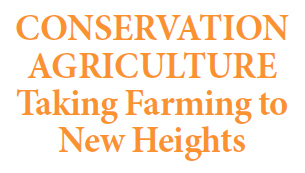|
October 2016

Issue Home >>
|

 Perennial flooding may soon be a thing of the past if a new project by The Department of Food Production of the Faculty of Food and Agriculture is successful. In the project, farmers will have the opportunity to test experimental seedling transplanter technology which allows them to cultivate steep slopes without contributing to landslips and flooding. Perennial flooding may soon be a thing of the past if a new project by The Department of Food Production of the Faculty of Food and Agriculture is successful. In the project, farmers will have the opportunity to test experimental seedling transplanter technology which allows them to cultivate steep slopes without contributing to landslips and flooding.
Apart from the environmental benefits of this technology, it will eliminate the need for back-breaking hand tilling in areas inaccessible to tractors. This will make farming less laborious for our aging farmer base and will hopefully attract a younger generation of farmers weary of spending long hours in the sun.
The project entitled Conservation Agriculture for Climate Change Adaptation in the Caribbean is being supported by the Caribbean Catastrophe Risk Insurance Facility (SPC) which was established in 2007 as a Caribbean-wide catastrophe relief fund to limit the economic impact of hurricanes and other natural disasters. Thus, the long-term hope is that after initial testing in Trinidad and Tobago, this technology will be rolled-out in the other members of the facility which include: Anguilla, Antigua & Barbuda, Bahamas, Barbados, Belize, Bermuda, Cayman Islands, Dominica, Grenada, Haiti, Jamaica, St. Kitts & Nevis, Saint Lucia, St. Vincent & the Grenadines, Turks & Caicos Islands and Nicaragua.
The project is the brain-child of Dr Mark Wuddivira, Senior Lecturer in Soil Science of the University of the West Indies, St. Augustine and Renaldo Belfon of the University of Guelph, Canada. However, additional project team members are being sought from a wide range of backgrounds including economics, farming, environmental conservation and extension and communication.
Cognisant of the call for more impactful research coming out of the UWI, this interdisciplinary approach will help ensure that the project produces tangible results and contributes to regional food security. “We were not interested in another project aimed at just producing more scientific papers. To engage in a practical project that enhances productivity and people’s livelihoods was the overall goal. We also wanted to give an opportunity to a good graduate student who could bring even more value to the project while completing their thesis work.” says Dr Wuddivira.
A field trial of the technology is being planned at the new UWI Field Station at Orange Grove, while a number of training sessions and workshops will be held for farmers and extension officers starting early next year. For updates on the project check the projects Facebook page at https://www.facebook.com/caccac2016. Farmers and other stakeholders interested in participating in the project should contact Dr Wuddivra at: mark.wuddivra@sta.uwi.edu and Renaldo Belfon at: renaldo.belfon@gmail.com.
|





